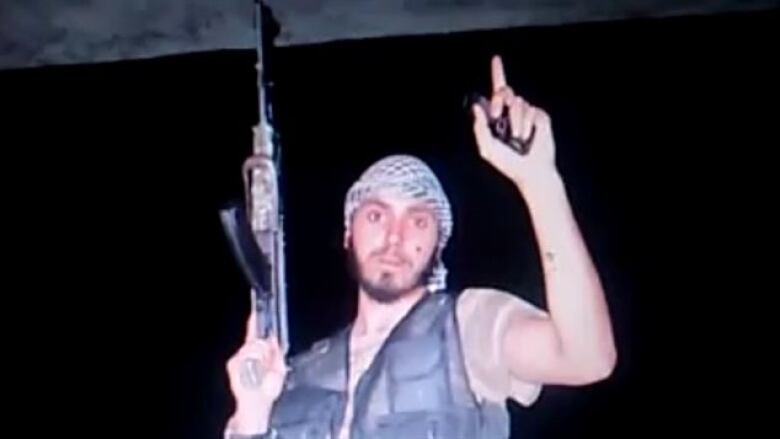Quebec man found guilty of trying to join ISIS
Ismael Habib caught by undercover RCMP officers saying it was his 'duty' to wage jihad

A 29-year-old Quebec manhas been found guilty of trying to join ISIS, in a case that legal experts say is a major test of Canada's anti-terrorism laws.
IsmaelHabibis the first adult to proceed to trialon charges of attempting to leave Canada to participate in the activities of a terrorist groupa section of the Anti-terrorism Act enacted by the Stephen Harper government in 2013.
Habib sat still, listening intently while Quebec court Judge Serge Dlisle read his decision.
Habib was arrested in February 2016, following an elaborateRCMPinvestigation that included a so-called Mr. Big operation.
During the trial, it was revealed that Habibtold an undercoverRCMPofficer posing as a crime boss peddling fake passports that it was his "duty" to fight jihad alongside ISIS in Syria.
Unbeknownst toHabib, his confession was videotaped, and the Crown, led by federal prosecutorLyneDcarie, entered that video as evidence to bolster its arguments.
During Habib's testimony in his own defence, he tried to explain awayhis confession. He told the court he wanted to go overseas to rejoin his wife and children, who had been living abroad without him.
He confessed to wanting to fight with ISIS, he said, because he desperately wanted the undercover officer to give him a passport and he thought he was telling the officer what he wanted to hear.
Credibility questioned
In his decision, Dlisle rejected Habib'sversion of the facts, saying he had a history of deception.
Dlislesaid that wasinconsistent with other evidence heard in court: that he was looking online for other girlfriends and eventually moved in with another woman inGatineau.
When he started dating the woman inGatineau, he initially didn't tell her he had a wife living overseas,Dlislenoted.

The judgealso wrote thatHabib'scredibility was hurt because he had tried on multiple instances to obtain a false passport and continued to take government financial support for his schooling despite having a record of dropping out or being kickedout for poor marks.
Crown pleased with decision
The judge's decision essentially agrees with the version of facts put forward by Crown prosecutorLyne Dcarie.
"We are very satisfied,"said Dcarie.
The defence, represented by Charles Montpetit, said he and his client will take time to reflect on what the judge wrote.
"My reaction is that I feel a little bit disappointed for sure, but we have to think it over," said Montpetit.

Habib was arrested in February 2016,not long after his taped confession, in his home inGatineau, Que., on unrelated charges of uttering threats and harassment, after an apparent domestic dispute.
Once in custody, he was charged with the terrorism-related offence.
Habib now faces amaximum 10-year sentence under the Anti-terrorism Act. He will return to courtAug. 17 for a sentencing hearing.
In May, he had been found guilty of providing false information in order to obtain a passport. That chargecarries a maximum sentence of two years.
'A landmark decision'
Although Montpetit said he'll have to discuss with his client before deciding whetherto appeal, at least one legal observer is anticipating there will be court challenges tothe provision of the act used to charge Habib.
Charles Ct, a criminal lawyer, said it was likely theSupreme Court of Canada would be called upon to decide its constitutionality.
"It's a landmark decision that will be put down today," Ct told CBC News before the decision was announced.
"It's quite a brand-new type of law that we're experiencing here in Canada."
What is a "Mr. Big" sting?
In a Mr. Big sting, undercover police pretend to be part of a criminal organization. An officer posing as a gang member befriends the suspect, and after being hired to do menial odd jobs, the suspect is confronted by the boss of the fictitious gang and told to either confess to a past crime or explain some incriminating evidence in the boss's possession.
A Mr. Big confession can be found admissible only if it proves to be a critical piece of evidence that is corroborated by other evidence and if the police can show they have not abused their power in persuading the accused to confess.












_(720p).jpg)


 OFFICIAL HD MUSIC VIDEO.jpg)
.jpg)



























































































